Hi there,
This week, I’m sharing the audio of episodes 2 and 3 of my first memoir In My Gut, I Don’t Believe.
The full audiobook is available on Audible and Amazon.
In My Gut I Don’t Believe: A Memoir. Written by Joe Armstrong. Narrated by Joe Armstrong.
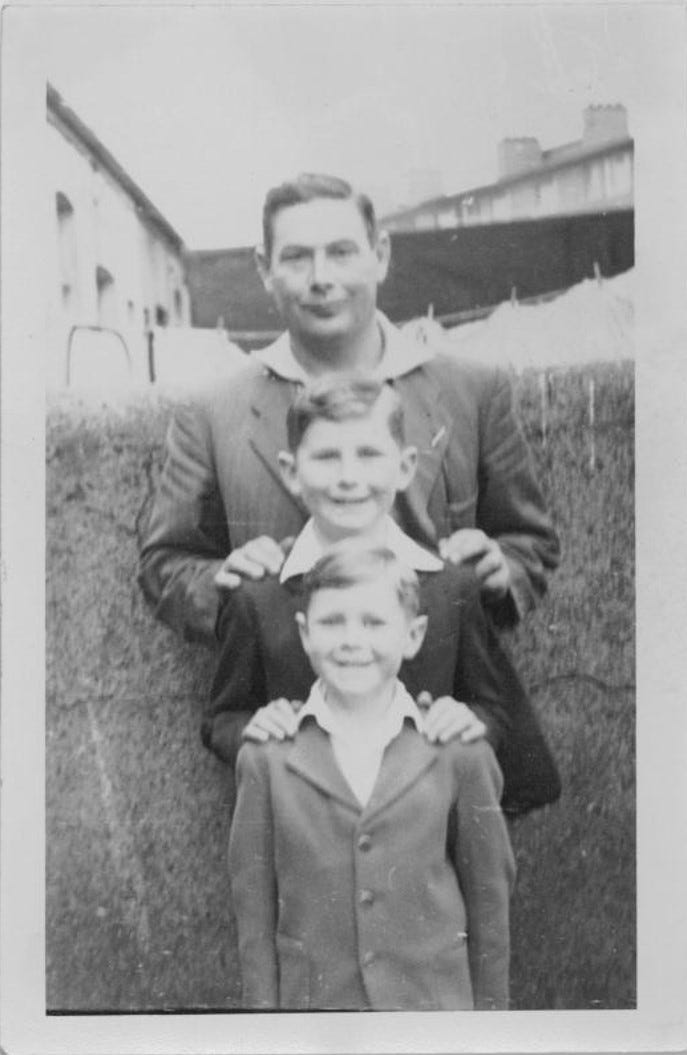
Chapter 1
‘Many souls will be saved’
#2
Faith is caught not taught, as believers say, without realising that so too is a virus. Having caught faith as a child, I was taught what was right and wrong. Founded by God, the Catholic Church had infallibly determined its teachings on things like Heaven, Hell, salvation, damnation, masturbation, pre-marital sex, contraception, marriage, divorce, abortion, homosexuality, vocation, celibacy and women’s ordination.
Who was I, a fallible individual, to question its authoritative teachings based on scripture, tradition and the magisterium of the Church? Aged 17 at secondary school I was slapped in the face by my religion teacher for asking a question. And I was at that time a committed Christian!
But let’s go back, younger; way younger.
My father’s first wife, Joan, had died in 1958 soon after giving birth to their third child Arthur. The baby died too. Their other two sons, Paul and David, were aged only six and three. Just over a year after Joan’s death, at the ordination to the priesthood of his brother John in Rome, my father proposed to my mother.
A photograph of my mother Pauline taken at Lourdes just four years earlier shows her, then in her early thirties, dressed as a ‘Child of Mary’ like the Virgin Mary, complete with veil and cape, beside two other women, similarly attired. Behind the three women is a statue of the Blessed Mother with a halo around her head.
A swift six months after their engagement, Arthur, aged forty-two, married Pauline, aged thirty-six, my uncle Father John officiating. A year and a half into the marriage, my sister was born. I followed a year later, in 1962, when Pope John XXIII convened the Second Vatican Council and the Beatles signed their first music contract. The Cuban missile crisis erupted. Kennedy faced down Khrushchev and the world feared nuclear Armageddon.

For Paul, the bombs had been going off ever since the death of his mother. Three weeks after running away for the last time in his mid-teens, he came home; dishevelled, cold and hungry. But he did not spend that night there; nor any other night. The story of the Prodigal Son would not be re-enacted. He was banished, that evening, from his home forever. My mother made sure of that. Either he was going or she was going, and the latter was never likely.
I determined—out of fear—that I would be a ‘good boy’. I dreaded meeting with her disapproval, being cast off by her like Paul was, expelled from home like Adam and Eve. If you crossed her, you lost. Love became shot through with fear. I loved her—she was my mother—yet I was terrified of her too.
My father had to arrange for his brother and my namesake Uncle Joe Armstrong to take Paul. Later that year, my father had a heart attack—a stroke and a heart attack before he was forty-nine.
Paul would live with Uncle Joe and his wife and son for the next two years before joining the army. He only returned to our house once during the next four years and that was to paint a ceiling.
I recall an incident when I was a young child. I had been naughty and my mother insisted I join her kneeling before the picture of the Sacred Heart of Jesus. It hung in pride of place over the fireplace in the small back living room of our end-of-terrace house in Donnycarney, Dublin. At the centre of the picture beat a radiant heart, dripping blood. The top of the heart had a cross on fire. A crown of thorns surrounded the heart like a belt. Jesus suffered for us.
His large, all-seeing eyes followed you throughout the room, reading your mind and knowing your every sin. A panel in the corner of the picture declared: ‘I will bless the house in which the image of My Sacred Heart shall be exposed and honoured.’

My mother beseeched the Sacred Heart to make me a good boy, blessing herself repeatedly and joining her hands with fervour. Her hands were clenched, her head bowed, then she craned her head upwards with each new entreaty. Jesus gazed down upon us from the chimney breast. Even as a young boy I was unconvinced by my mother’s unquestioning devotion.
Yet despite my embarrassment at my mother’s piety, I was susceptible to the belief that she had a hotline to an omniscient God. On another occasion when I’d misbehaved, she knew immediately—as any adult would have known—whatever misdemeanour I’d done, even though she hadn’t witnessed the unremarkable incident.
‘How did you know that?’ I asked, awestruck by her seeming access to divine omniscience.
‘Holy God told me.’
Her lie made a deep impression on my young mind. The myth of God was taking root in me. It was catching.
#3
I have recounted how my brother Paul was banished from home when he was only 16, and I was just five. And David?
One day my mother wailed in pain, accusing David: ‘He slammed the door on my hand!’
‘It was an accident!’ cried David.
‘He did it on purpose!’ she insisted.
‘It was an accident!’ David pleaded.
I do not know whether or not it was an accident and probably my father didn’t know either. He felt trapped between his second wife and the sons of his first marriage and he ordered David out to what we called ‘the passage’, the narrow pathway that had linked the front and back gardens of our house. Now it was enclosed with a pitched roof, a door at either end. I heard the door slam from the kitchen to the passage, then David’s thrashing and cries of pain, which seemed to last for ages.
Another time I remember my dad ordering David, who was seven years older than me, to strip in the living room, while I was there. I can’t recall if he was beaten but I know I felt embarrassed for my brother, naked in front of me.
Neither the expulsion of Paul nor the violence and humiliation visited upon David deterred my parents’ dutiful exercise of their religion. I recall in 1970, when I was eight, a likeable, elderly Christian Brother quizzing pupils about our families’ religious practice.

‘Hands up, boys, who goes to mass every Sunday?’
Every hand shot up.
‘Hands up if your mammy goes to mass every day.’
Several hands shot up, including mine.
‘Hands up if you have a relative a priest.’
Several hands ascended. He asked us to elaborate.
‘Sir, my Uncle John is a priest in South Africa,’ I answered with pride.
‘Isn’t that fabulous, boys?’
‘Yessir!’ resounded the class.
I used to hate going home from school on washing day. The tension was palpable. My mother would concede she would be ‘up to high do’. Maybe it was before she was prescribed diazepam. She had to pull the washing machine out from the wall so she could feed the clothes through the wringer at the back. The tiny kitchen would look like a warzone, with clothes on the table, on the floor, in the machine and sticking out of the wringer.
My mother, like the washing, was strung out. She was in the trenches, fighting to the death with the soiled clothes. If it was raining, she couldn’t hang out the wet clothes. If it was dry and they were on the line, she would watch the clouds like a prowling enemy, darting out to take in the washing at the first drop.
A boy my own age used to call to see if I’d like to come out to play. I liked him, but my mother didn’t approve of him. She felt he was ‘common’. I didn’t want to cross her, so I discouraged my friend’s visits and he stopped calling; a lost chance for friendship. I used to play with other boys on our street. One boy told me his dad was an engineer.
‘He’s not an engineer,’ my mother told me scornfully. ‘He’s a mechanic.’
I didn’t know what either job was, if there was any difference between them or why it mattered. But it mattered to my mother.
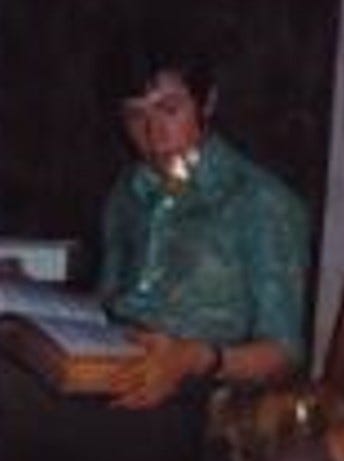
David, like Paul before him, disappeared from home aged 16 or 17, probably in 1972 (possibly 1971). I was about ten (maybe nine). I didn’t know where my brother had gone or what caused his departure. There was a vague sense that he might be in London; or maybe Spain. We had no contact details for him so we didn’t know if he was alive or dead.
After he had left, I was prohibited from entering David’s bedroom. In fact, his bedroom was kept locked. It was strange growing up in a small three-bedroomed house with one bedroom permanently locked. David’s disappearance, and the fact that he, like Paul before him, was rarely spoken about, intrigued and perplexed me. Whenever I asked about him, I was fobbed off.
I sensed my father’s anguish but I had to resign myself to not knowing where David was or why he had vanished. My mother acted as if it was perfectly natural for young siblings to disappear and never come back.
‘Once I turn against someone, that’s it,’ my mother once said to me.
Home felt unsafe for this five-year-old, witnessing Paul’s banishment; this 10-year-old grappling with David’s permanent, unexplained disappearance and the implacable conspiracy of silence. My father saying nothing. My mother pretending this was normal. I wanted to understand. I craved security; that I wouldn’t be next, falling foul of my mother’s steely-stated incapacity to forgive and its terrifying consequences seen through the eyes of a young boy.
*
The full audiobook of the acclaimed memoir In My Gut, I Don’t Believe by Joe Armstrong is available on Audible and Amazon. It’s also available in Kindle, paperback, and hardback editions.
Happy days,
Joe
Joe the Human is a reader-supported publication. To receive new posts and support my work, consider becoming a free or paid subscriber.
Click here for Spotify Link to So Glad I Married You
Click here for YouTube Link to So Glad I Married You
Click here for iTunes, Apple Music and Deezer links to So Glad I Married You.
Click here for link to Joe Armstrong’s recommended four-song Spotify playlist by The Rayne
Listen to Joe Armstrong’s Podcast ‘Losing My Religion’ here. Or wherever you get your podcasts.
Listen to Joe Armstrong’s finalist award winning New York Festivals World’s Best Radio Programs From Belief to Unbelief, made with Nicoline Greer




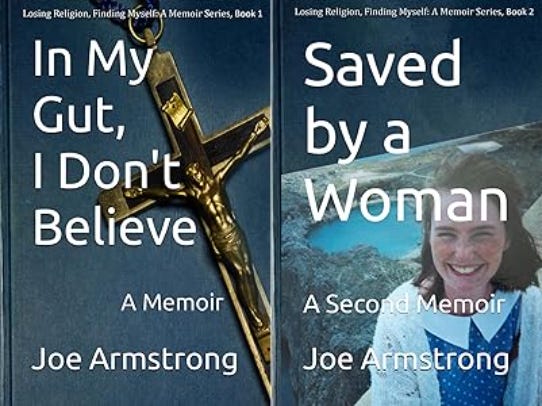



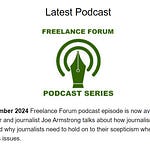




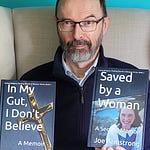
Share this post